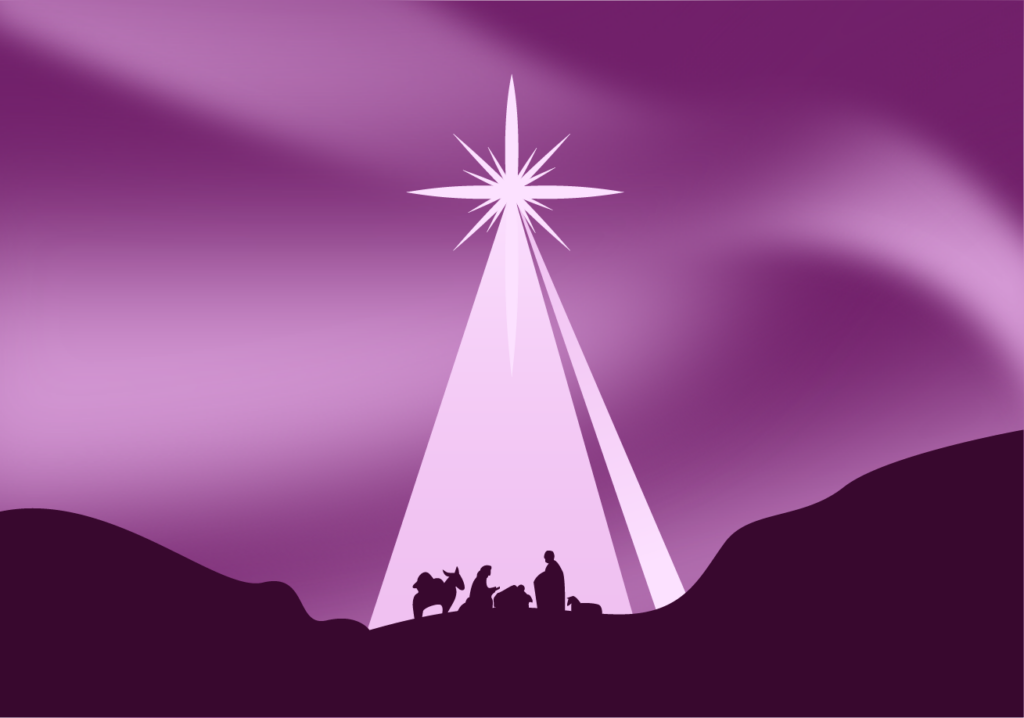Epiphany/3 Kings Day Table of Contents:
If you grew up in a household that kept its Christmas tree up until January 6th, you’re probably familiar with Epiphany.
This important Church feast has been observed longer than the December 25th celebration of Christmas and remains a key celebration of the liturgical year. It marks a transition back to Ordinary time, which remains until Ash Wednesday, the start of Lent.
Learn about the Epiphany and what it means for our prayer lives below.
What is the Epiphany?
The feast of the Epiphany commemorates the arrival of the magi (sometimes referred to as Three Kings or Wise Men) to visit Infant Jesus.
The USCCB describes the Epiphany simply by saying it “marks the arrival of visitors, identified in Scripture as the magi, to the place where Jesus was born.” The word itself means “divine revelation.”
The Catechism goes a little further, telling us the Epiphany “celebrates the adoration of Jesus by the wise men (magi) from the East, together with his baptism in the Jordan and the wedding feast at Cana in Galilee.”
The roots of the celebration of the Epiphany date back sometime between the third and sixth centuries.
The Epiphany is celebrated on January 6th each year and is usually observed on the Sunday between January 2nd and 8th. It is not a Holy Day of Obligation.
Epiphany in the Bible
The Gospel reading on the Epiphany, which tells the story of the three wise men arriving in Bethlehem to find Jesus, comes from Matthew, Chapter 2:
When Jesus was born in Bethlehem of Judea,
in the days of King Herod,
behold, magi from the east arrived in Jerusalem, saying,
“Where is the newborn king of the Jews?
We saw his star at its rising
and have come to do him homage.”
When King Herod heard this,
he was greatly troubled,
and all Jerusalem with him.
Assembling all the chief priests and the scribes of the people,
He inquired of them where the Christ was to be born.
They said to him, “In Bethlehem of Judea,
for thus it has been written through the prophet:
And you, Bethlehem, land of Judah,
are by no means least among the rulers of Judah;
since from you shall come a ruler,
who is to shepherd my people Israel.”
Then Herod called the magi secretly
and ascertained from them the time of the star’s appearance.
He sent them to Bethlehem and said,
“Go and search diligently for the child.
When you have found him, bring me word,
that I too may go and do him homage.”
After their audience with the king they set out.
And behold, the star that they had seen at its rising preceded them,
until it came and stopped over the place where the child was.
They were overjoyed at seeing the star,
and on entering the house
they saw the child with Mary his mother.
They prostrated themselves and did him homage.
Then they opened their treasures
and offered him gifts of gold, frankincense, and myrrh.
And having been warned in a dream not to return to Herod,
they departed for their country by another way.
Feast of the Epiphany / Three Kings Day
The traditional date for the Epiphany is January 6th, though it’s often observed on “Epiphany Sunday”– the Sunday between January 2nd and 8th. Hymns like “Christ, Be Our Light” are common at Mass on this day, as we’re reminded of the magi following the shining star–and our own call to follow Christ, our Light.
Christmas Day has become a much bigger celebration than the Epiphany, but many American parishes will feature some festivities. Some families will host parties and keep their Christmas trees up. Once the Epiphany is over, it marks the end of the Christmas season.
In Latin American cultures, the Epiphany is sometimes known as Día de Los Reyes or Three Kings Day. Sometimes, gifts are exchanged on this day instead of on Christmas. Children also write letters, left in their shoes, addressed to the three kings, who in return, leave gifts in their shoes.
In Eastern traditions, the Epiphany is sometimes called Theophany. Rather than focusing on the arrival of the magi, Theophony centers on “Jesus’ divinity at this Baptism in the River Jordan.”
Epiphany and the Gifts We Receive
The three wise men, known as Melchior, Caspar, and Balthazar, bring gifts of gold, frankincense, and myrrh.
Pope Francis, during his 2023 homily on the Epiphany, shared a new perspective on the magi.
He explained that, while they are best known for the gifts that they receive:
- The gift of call–God calling them.
- The gift of discernment–being able to ignore Herod and choose God’s way.
- The gift of surprise–meeting God in a humble manger.
Pope Francis suggests these are calls that we all receive.
“Brothers and sisters, we are all called — the first gift: the call — by Jesus; we can all discern — the second gift: discernment — discern his presence; we can all experience his surprises — the third gift: the surprise,” he said.
Epiphany Prayers
Given what the Epiphany means to us, and how it celebrates the wise men following a path to Jesus, consider prayers for hope, since it’s a feast of great hope as we strive to follow our own path towards Christ.
“Truth, by which the world is held together, has sprung from the earth, in order to be carried in a woman’s arms … Truth, which heaven is not big enough to hold, has sprung from the earth, in order to be placed in a manger.” – St. Augustine
Also, consider beginning a novena on this day. The Holy Family novena or novena to the Holy Infant of Prague are good options.
Since the Gospel for the Epiphany represents some of the most important lines in Scripture, you may also enjoy praying over those words with lectio divina, and listening to how God’s Word may be speaking to you.
